|
Compiled and Edited by Mark_XON
Research Help by Lee
About Starship Data Firing Arc Designations
Expanded ARC Rules and Diagrams
This page is still in the very early stages of being written,
although considerable work has been accomplished....
This write-up is provided to research and expand on the FASA ARC RULES to
better support movement and unordinary weapons that may exist in the star
trek world, especially for TNG Collimator Phaser Arrays.
I used original FASA text that has been revised to help expand on what FASA
is explaining about their arc rules, since I'm not limited to a number of
pages for a book to be sold, nothing is omitted. ;)
TNG Phaser Array Note:
That FASA's rules indirectly cover the TNG phaser array's as the FASA rules
for Firing Arcs Stand now. So the top front array on a Galaxy Class could
fire p/f/s as a single weapon in multiple banks, allowing them to shoot
multiple shots from one array. The amount of shots allowed would probably be
best noted right on the Ship Data Sheet as it will be different for each
ship.
FASA's firing arcs have always varied in some of the Starship Combat games
and they always seem to be difficult to understand or except unless you
reverse engineer the mechanics behind it. Once you stomach all the info, you
may tend to settle for FASA's Standard FIRING ARCs or better yet you will
expand and perhaps see how newer and revised arcs can be beneficial to the
game, demanding more maneuvering of the starships and allowing unordinary
weapons to be used.
Although the STCS Manual doesn't explain too much about why arcs are the way
they are, earlier editions of Starship Combat do. For an example, from the
FAS2006 STIIISCRPG "Because of the limited power available, and because
of the limited arcs of fire, it is important to anticipate the movement of
the enemy. That way, power may be used to arm only those weapons facing the
enemy." You see this line of text similarly present in all Starship
Combat games except the STCS know that maneuvering your starship to get the
weapons lined up is very important. But with the revised arcs present in
STCS, this is hardly necessary.
FASA References Used:
- 2001A The RPG (1st Edition) pg 106,107 and the Full Combat Panels
- 2001A The RPG (1st Edition v1.1) pg 106,107
- 2003 STIISCS Book One pg 6-B,7-A
- 2006 STIIISCG Book One pg 6-B,7-A
- 2006 STIIISCRPG pg 12,13
- 2003A STCS pg 16,17, 56
- 2214 Star Trek III: Sourcebook Update pg 22
Terms (Rules) used for the various type of ARC Diagrams:
FASA's firing arcs have always varied in some of the Starship Combat games and
they always seem to be difficult to understand or except unless you reverse
engineer the mechanics behind it. Once you stomach all the info, one tends to
settle for FASA's Standard FIRING ARCs. Although the STCS Manual doesn't explain
too much about why arcs are the way they are, or how the Starship Stats would
look like in a diagram when dealing with a particular weapon. I chose to devise
a "WEAPON ARC" for the Miranda's unique weapon system. The choice for naming
such a diagram came directly from FASA's constant referral of single emitters as
'Weapons', they also represent the weapon stats in the same terms. Anyhow the
new diagram adds a FASA-like alteration to the rules without totally rewriting
the firing arc rules.
- FIRING ARC DIAGRAM - This is the standard game FIRING ARC, be it FASA's
or a custom design.
- WEAPONS ARC DIAGRAM - This is a diagram that temporarily modifies the
standard FASA FIRING ARC DIAGRAM when a special weapon is used.
- STARSHIP DATA DIAGRAM - This is a NEW diagram that is based on FASA's
starship stats firing arc call designations such as f/p.
Evolution of Starship Combat Firing Arc Diagrams:
FIRING ARC DIAGRAM - This is the standard game FIRING ARC
for the 1st Edition Rulebook Starship Combat (SC).
Each weapon on board a ship has a firing arc. This arc specifies in what
direction (relative to the ship's facing) the weapon can be fired.
Firing Arcs
The firing arc of a weapon depends on the type of weapon and where it is
mounted, and may vary from ship to ship. There are four possible firing arcs for
normal ship weaponry; (fwd) forward, (prt) port, (stb) starboard, and
(rear) aft. A single weapon (or "bank" of more than one weapon installed
together) may be specified on the helmsman's console as facing any of these arcs
(possibly more than one). Thus, it can fire at an enemy only if the enemy
falls within its arc of fire. Arcs of fire for forward, port, starboard, and aft
mounted weapons are shown on the accompanying chart below.
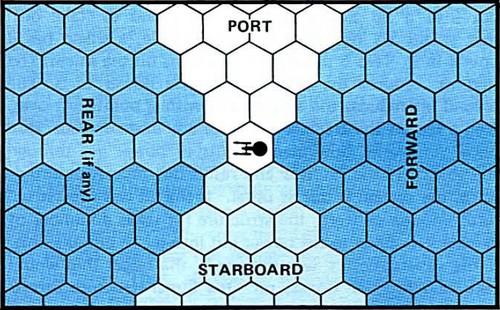
How to speak the arcs (or type)
THE FOUR MAIN FIELDS
fwd FORWARD
prt PORT
stb STARBOARD
rear AFT (if any)
TYPICAL COMBINATIONS
none given in the book, but they are possible in the 1st Ed. See next
Diagram below for an explanation.
FIRING ARC DIAGRAM - This is the standard game FIRING ARC
for the 1st Edition v1.1 Starship Combat (SC).
Firing Arcs
The Firing Arc information is the exactly the same as it's presented
above, BUT you must notice the words in bold: "(possibly more than one)".
This bit of text indicates that an un-normal weapon can use multiple or
Combination Arc's. UFC465537(Joe) made the following diagram to help the player
actually SEE this in graphic form within the main rulebook, see how smart he is! FASA
only provided this newer diagram on the Full Combat Panels that came with the
game. I'm assuming these panels where made up after the book itself went to
print.
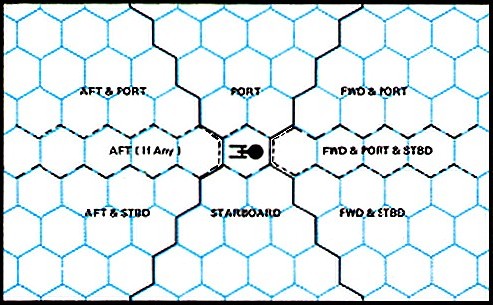
How to speak the arcs (or type)
THE FOUR MAIN FIELDS
fwd FORWARD
prt PORT
stb STARBOARD
aft AFT (Rear) (If Any)
TYPICAL COMBINATIONS
fwd&port FORWARD and PORT
aft&stbd AFT and STARBOARD
FIRING ARC DIAGRAM - This is the standard game FIRING ARC
for the STIISCS, STIIISCG and STIIISCRPG.
Firing Arcs
There are four possible Firing Arcs for normal ship weaponry: forward (to the
front of the ship; abbreviated fwd), port (to the left of the ship), starboard
(to the right of the ship; abbreviated stbd), and aft (to the rear of the ship).
These Firing Arcs are given relative to the firing ship's heading. They specify
the directions of fire for each single weapon, or each weapon bank that operates
like a single weapon. Only vessels that fall within a weapon's Firing Arc are
legitimate targets for that weapon. Ships in the same hex may not fire at one
another. The diagram below shows the Firing Arcs. Note that Firing Arcs do not
correspond to hex sides and that they overlap to some extent. All weapons that
fire port also fire forward and aft to some degree, as do weapons that fire
starboard, as the diagrams show.
The Ship Data Tables give the Firing Arcs for each of the weapons a vessel has.
Depending on the vessel and the weapon, one or more arcs may be given. Thus, if
the weapon is mounted on the front of the ship, its Firing Arc will be fwd; if
it can also fire to the right, its Firing Arc will be listed as fwd/stbd.
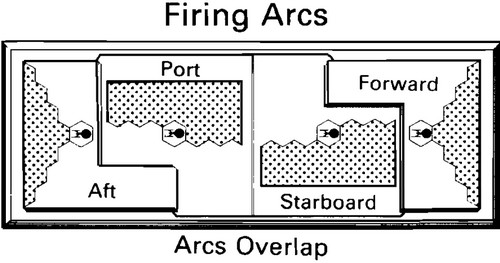
How to speak the arcs (or type)
THE FOUR MAIN FIELDS
fwd FORWARD
port PORT
stbd STARBOARD
aaft AFT (Rear)
TYPICAL COMBINATIONS
f/p FORWARD PORT
f/s FORWARD STARBOARD
FIRING ARC DIAGRAM - This is the standard game FIRING
ARC.
The Ship Data Tables give the Firing Arcs for each of a vessel's weapons. Each weapon,
whether it is a beam weapon or a missile weapon, has a field of fire determined by its
placement on the ship. Four fields of fire are designated, but the placement of some
weapons allows them to bear on more than one field; one or more arcs may be given.
Firing Arcs
The four fields are f (forward), p (port), s (starboard), and a (aft); combinations
are designated by a slash (/), such as f/p, which means that the weapon can fire
into the forward and port arcs of the vessel. Thus, if the weapon is mounted on the front
of the ship, its Firing Arc will be f; if it can also fire to the starboard (right), its
Firing Arc will be listed as f/s. (If you have trouble remembering the directions referred
to by the terms port and starboard, try remembering that port and left have the same
number of letters.)
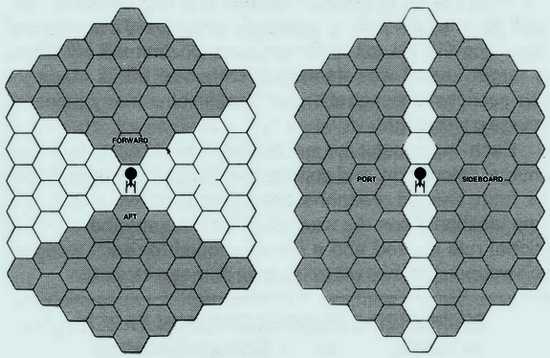
How to speak the arcs (or type)
THE FOUR MAIN FIELDS
f FORWARD
p PORT
s STARBOARD
a AFT
TYPICAL COMBINATIONS
f/p FORWARD PORT
f/s FORWARD STARBOARD
This diagram is new to FASA Starship Combat as of the STCS. Many fans have
considered this diagram to be way too generous and has effected the amount of
movement a ship needs to do in order to line up a shot. In other words, a ship
could literally sit still and be able to shoot at all his targets, only minimum
movement would be required. I think a new diagram needs to be made to help
increase movement on the playing field.
NEW, something called a
"Weapon Arc" Rule:
WEAPONS ARC DIAGRAM - This is a diagram that temporarily modifies the standard
FASA FIRING ARC DIAGRAM when a special weapon is used.
Depending on the vessel and the weapons capabilities, special arcs may be given.
Allows for custom weapon arcs on a per-ship bases, without altering construction
methods.
I choose to do some research and devised a partially 'NEW' type of arc field, the
"WEAPON ARC" for the write-up on the Miranda's unique weapon system. The new
diagram adds a FASA-like alteration to the rules without totally rewriting the
FASA firing
arc rules. The choice for naming such a diagram came directly from FASA's
constant referral of single emitters as 'Weapons', everything else is called
'Banks' or 'Pairs'. Special Note: As pointed out to
me, these new rules allow the
construction of ships more precisely that have been difficult or impossible to do before.
Such as a lot of the Jackill's vessels and other similar vessels online.
The following diagram is a WEAPONS ARC DIAGRAM not the FIRING ARC DIAGRAM,
This Chart is in addition to the standard FASA FIRING ARC CHART, that's normally
used. You will see that the Miranda Class Starship can only fire directly
forward when using it's special or un-ordinary weapon, the Phaser Cannon. Also
the Phaser Cluster on each pod can only fire at Limited angles off to the
left and right.
See XON's Miranda Class-STII Reliant NCC1864 Write-up more more
details.
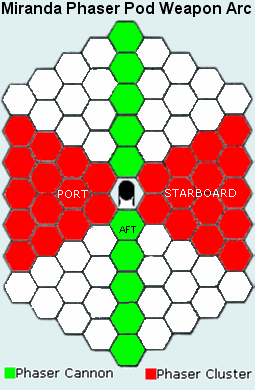
CUSTOM ??????
1f/a,1f/a single row of hexs,
4p,4s weapon fires a limited port or starboard arc only
2f,2a 1f and 1a at a time
How to speak the arcs (or type)
FASAs Original Extended Weapon Rules and my Miranda's Write-UP Extended Rules
In the weapon stats you may run into some unfamiliar 'rulings' regarding when
a weapon can be used/fired and if the standard firing arc is a modified one.
Some of these rules are the result of FASA's other publications that may have
included extended weapon stat rules, these are rules that don't require any
modification to the starship construction rules. I have also used these rules in
this write-up to remain consistent with FASA. My additions include slight
variations of FASA's new extended starship data weapon stat rules(the "at any
time" ruling), and are totally FASA-like.
- "weapon fires directly forward only" - This is a Fire Arc
Restriction, temporarily modifies FASA's standard Firing Arc to a single row
of hexs.
- "weapon fires directly aft only" - This is a Fire Arc
Restriction, temporarily modifies FASA's standard Firing Arc to a single row
of hexs.
- "weapon fires port or starboard in a limited arc only" - This is
a Fire Arc Restriction, temporarily modifies FASA's standard Firing Arc;
narrows the arc, most usualy only by one row of hexes.
- "at any time" - This is FASA's rule from the STIII Sourcebook
when dealing with the "Paired Bank Rules"
- "at a time" - This is a Rate of Fire restriction. In some cases
it also acts as a temporary weapon direction restriction.(based on the
configuration of the weapon)
A 'NEW' Rule, Weapon System Un-powered
- "When one weapon system is powered the other weapon system is
unavailable" - This is a NEW rule that basically doesn't allow for all
weapons systems to be available at the same time. This is usually done with
chaotic weapon systems of unique design, or in a situation when much more
fire power is available than resources and power. This rule also helps
balance a starship in the game so it can't be unreasonable when compared to
fully adequate and standard vessels with the proper resources.
Proposed Standard (2010):
This section outlines the various options on a future firing arc.
Which one do you think would work best?
PROPOSAL ONE
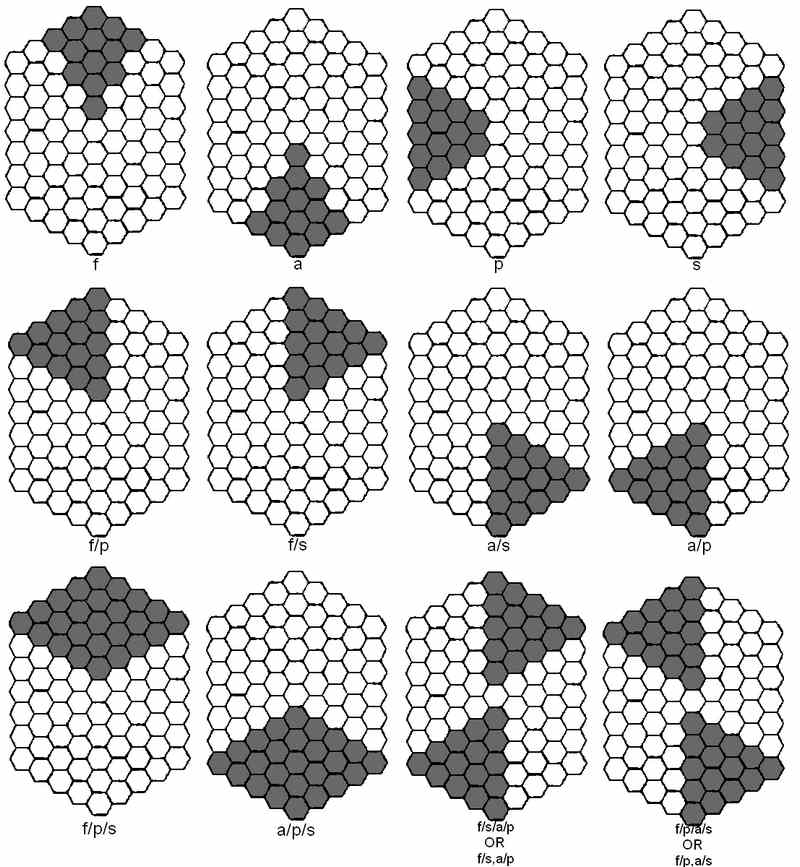
PROPOSAL TWO
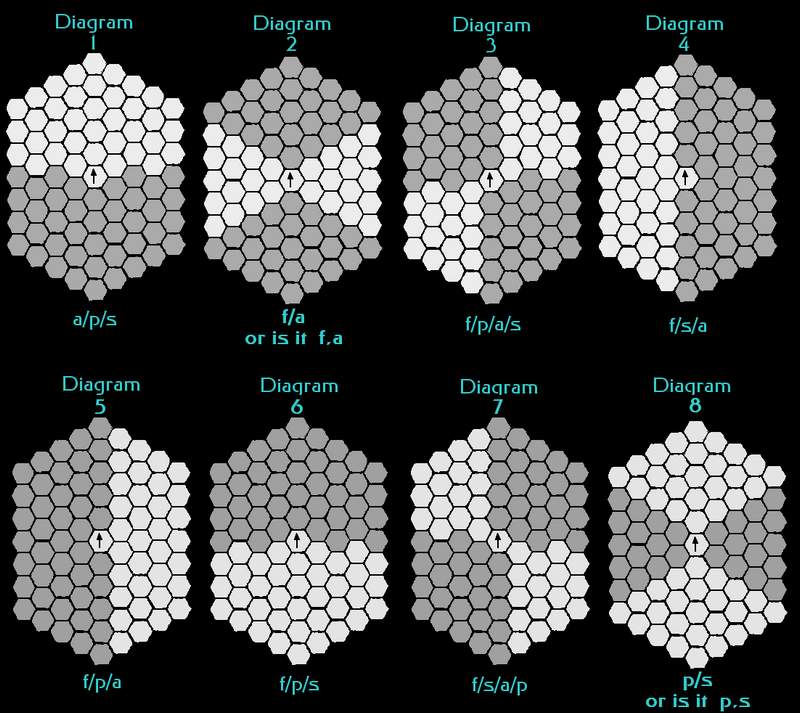
For the arcs, just to clarify, the forward/port and forward/starboard arcs
follow
the "tip" of the hex in which the ship is in between Shield Arcs 1 and 6
for port and Shield Arcs 3 and 4 for starboard.
PROPOSAL THREE
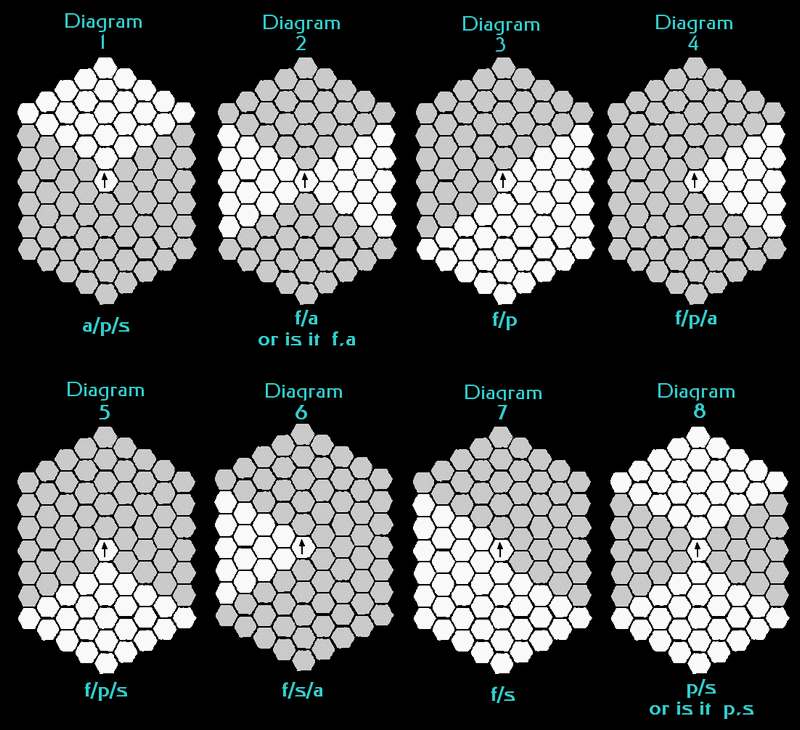
PROPOSAL FOUR
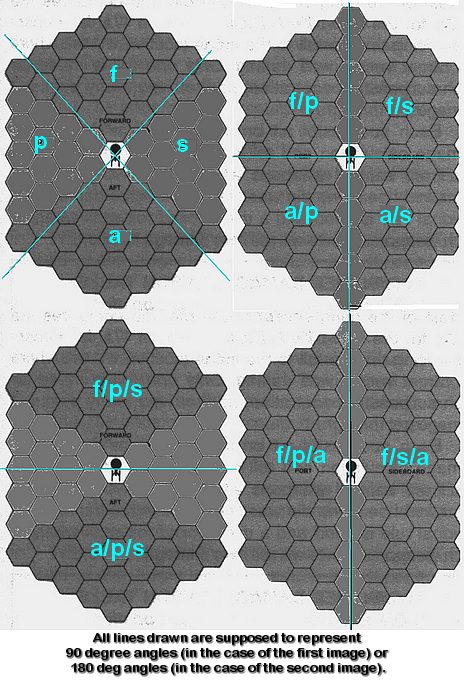
All lines drawn are supposed to represent 90 degree angles (in the case of
the first
set) or 180 deg angles (in the case of the second set).
Reasoning behind firing arcs:
Basically, the firing arcs taken represent a circle- 360 degrees.
There are 4 primary arcs: f, a, p, s. 360 deg divided by 4 is 90 deg. Each of
these arcs, then, is 90 deg. If the line intersects a hex, then it is
considered part of that arc (overlap is allowed, thus a hex may be in the
forward
AND starboard arc for instance.
For f/p, f/s, a/p, a/s: the arcs are again 90 degrees. These arcs are
(obviously) combinations of two arcs. For instance, in the arc of f/p,
the weapon is firing to the forward area of port (or the port area of
forward) hence the combination. Think of the words "forward/port" modifying
one another: it's, again, the "forward portion of port" or the "port
portion of forward" that is covered by the arc.
For the arcs of f/p/s and a/p/s, the arc is 180 degrees. The first arc
is covering the forward portion of port and starboard and the forward arc.
The second arc is covering the aft portion of port and starboard and the
aft arc.
For the arcs of f/p/a and f/s/a, the arc is 180 degrees. The first arc
is covering the port portion of both the forward and aft arcs and port.
The second arc is covering the starboard portion of forward and aft arcs
and starboard.
PROPOSAL FIVE
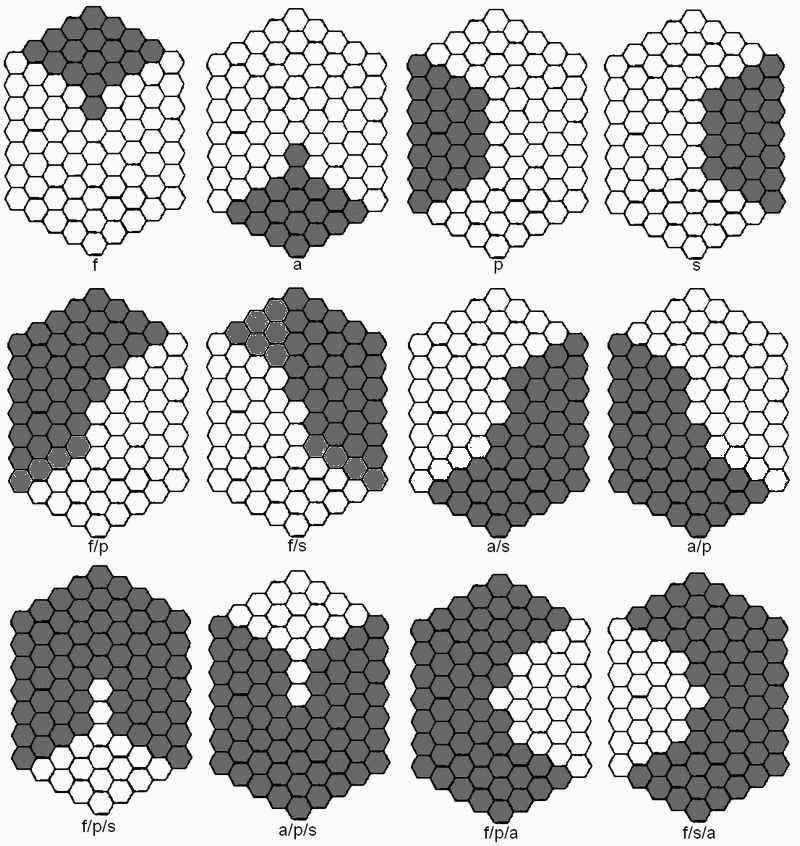
This is the final proposal. As you can see there are no overlapping in this one.
Perhaps there should be one row of overlap? What do you think?
|









